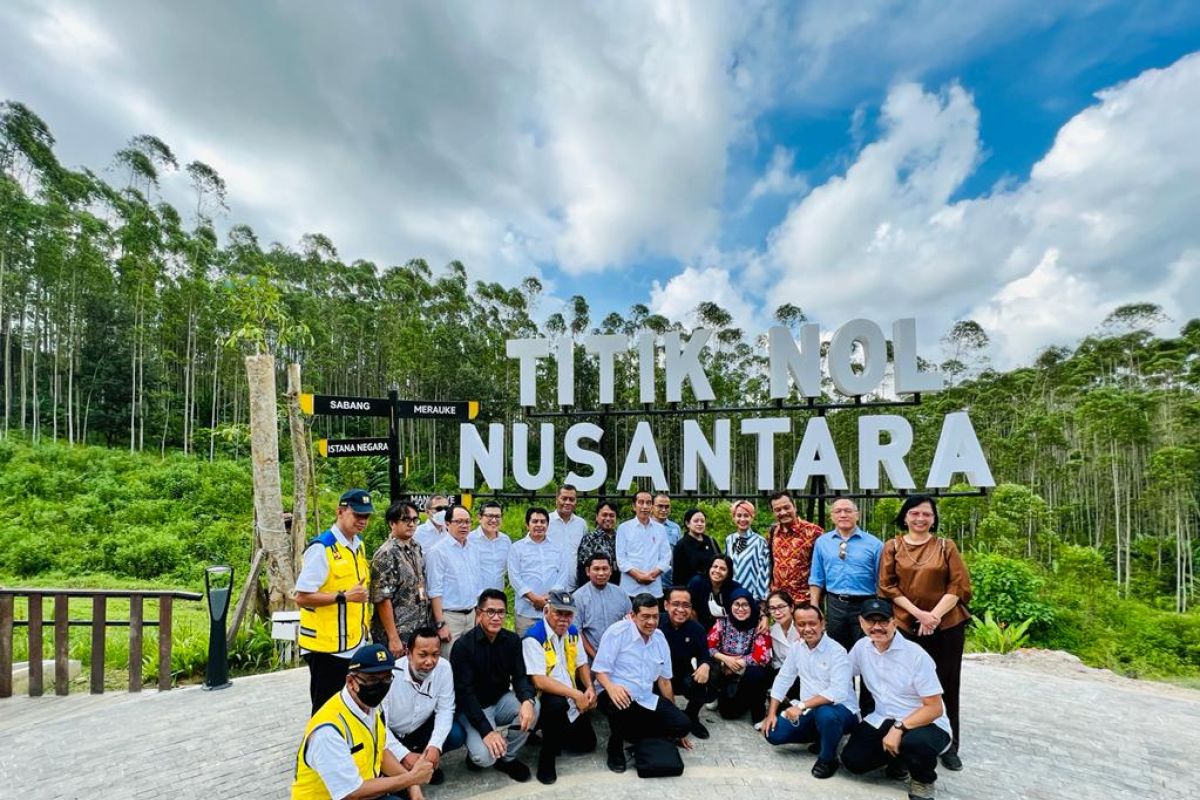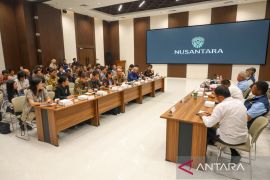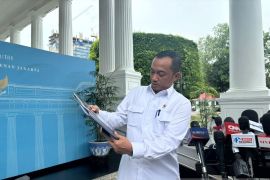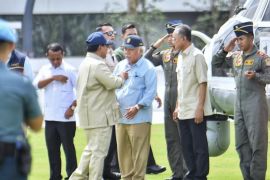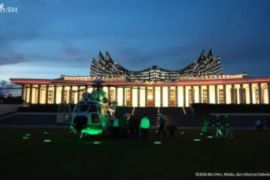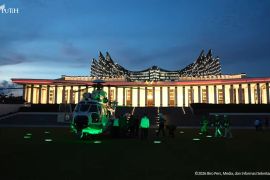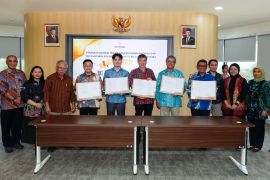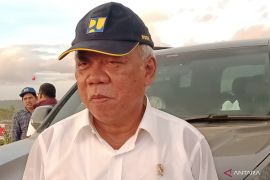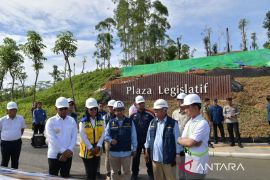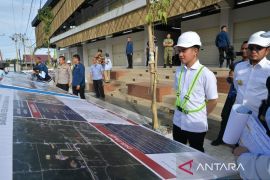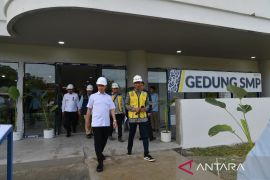Efforts to achieve equitable development and economy by reducing income inequality have been consistently pursued by President Joko Widodo (Jokowi), and this push has been reflected in various national policies.
According to the data from Statistics Indonesia (BPS), Java Island contributed 59 percent to Indonesia's economy in 2019. Meanwhile, the contribution of Kalimantan Island stood at only 8.05 percent, Sulawesi 6.3 percent, Maluku-Papua 2.24 percent, Bali-Nusa Tenggara 3.06 percent, and Sumatra 21.3 percent.
The contribution of metropolitan areas in Java Island, namely Jakarta, Bogor, Depok, Tangerang, and Bekasi (Jabodetabek), stood at 20 percent of the gross domestic product (GDP) in trade, 45 percent of the GDP in financial services, and 68 percent of the GDP in corporate services, according to BPS data recorded in 2018.
The economic attractiveness of Java Island, especially Jakarta, has led to the island becoming densely populated, reduced the carrying capacity of the environment, and increased the frequency of disasters on the island.
Java Island is home to around 57 percent of Indonesia’s total population. The large population has increased mobility in big cities, with support from adequate infrastructure.
For example, Jakarta recorded the fourth-highest traffic congestion rate in the world in 2017. In 2018, Jakarta was ranked 7th among cities with the highest traffic congestion rate in the world, which was pegged at 53 percent.
Traffic congestion in the greater Jakarta area has led to significant economic, environmental, and social losses. In addition, the decrease in the environment's carrying capacity has also posed the threat of disasters.
In view of this, President Widodo has directed the relocation of the country’s capital and the development of Nusantara as a new capital in East Kalimantan. The construction of the new capital, which is estimated to cost Rp466 trillion, is expected to mark a milestone in accelerating uniform development in Indonesia.
A world-class city for all
Widodo has emphasized that the relocation of the capital from Jakarta to Nusantara is aimed at achieving economic equity and uniform development.
Besides Jabodetabek, he wants other regions outside Java to also become “magnets” for the economy to support development and economic activities in the eastern and western regions of Indonesia.
Nusantara is also expected to become a new city that showcases Indonesia as a superior nation. Therefore, Widodo is targeting to make it a smart and green city, and a city offering sustainable and inclusive growth for all people.
He has set three specific targets for the development of the new capital, namely Nusantara will be “a 10-minute city” or a city where pedestrians can reach public facilities in 10 minutes. Then, it will have 75 percent green area (forest city), and it will be included in the top 10 livable cities in the world.
With these big aspirations, the plan for the development of Nusantara has been prepared for the long term until 2045, when the nation will mark the 100th anniversary of its independence.
The shifting of the capital to East Kalimantan will not only involve moving government buildings physically, but starting a new life and civilization there, according to Widodo.
The new capital city’s development will be divided into four phases. Phase 1 of the development from 2020–2024 will involve the initial stage of relocation to Nusantara. Phase 2 (2025–2035) will involve building Nusantara as a strong core area.
Phase 3 (2035–2045) will involve the building of infrastructures and ecosystems in three cities to accelerate the development of East Kalimantan. The next phase from 2045 onwards will involve strengthening Nusantara’s reputation as a “world-class city for all.”
Economic inclusion
Economic inclusion is one of the goals that the government wants to achieve in the development of Nusantara.
Therefore, one of the eight principles in the development of Nusantara as the new capital is “economic opportunity for all.” The seven other principles are Bhinneka Tunggal Ika (unity in diversity); natural condition-based design; connected, active, and easily accessible; circular and tough; comfortable and efficient with technology; safe and affordable and low carbon emissions.
The dictum "economic opportunity for all" is relevant to efforts to achieve equal access to modern urban facilities in the new capital. The population structure, which is directed to be heterogeneous with a large number of migrants, is also expected to create openness and allow equal access to information.
As a “city for all,” Nusantara is expected to create social cohesion and humanistic interactions among residents. This social cohesion is an important concept for the new capital because the heterogeneous population structure will allow cultural integration and conduciveness in commerce.
However, the principle of “economic opportunity for all” can only be realized if all human resources have good competitiveness, with capabilities that meet the needs of industries and the market.
To this end, it is essential that the development of the new capital be followed up with the development of human resources and the continuous involvement of the local people of East Kalimantan.
Head of the Nusantara Capital Authority (OIKN), Bambang Susantono, said that he is planning to hold various job and entrepreneurship trainings for the local community in North Penajam Paser, East Kalimantan.
This will be done so that the local community of East Kalimantan becomes an inseparable part of Nusantara's development. Several types of trainings will be held, including in construction, financial management, sewing, and baking.
The authority will also collaborate with non-governmental organizations (NGOs), state-owned enterprises (SOEs), and private corporations, as well as academics for reskilling (training in new skills) and upskilling (training to improve skills) the local community.
As for construction manpower, the capital’s development is projected to absorb a high number of workers. The early phase of construction in 2022–2023 will involve around 150 thousand to 200 thousand construction workers, Susantono noted.
The availability of jobs in the construction sector and other sectors is expected to create economic benefits for the people of East Kalimantan.
The OIKN is also actively involving local youth, such as students from Mulawarman University, in Nusantara's development.
Involving the local community is essential for maintaining the orientation of equitable distribution of economic benefits arising from the new capital’s development. The Indonesian government is designing Nusantara as a global superhub that will be locally integrated, globally connected, and universally inspired.
This concept will accord the new capital a strategic position in global trade routes, investment, and technology. According to the Capital City Pocket Book on the official website of the new capital, Nusantara will become the core nerve center of government and a center for green innovation, and the center of Industry 4.0.
The government has promised to continuously be open to the aspirations of the indigenous people, religious leaders, and youth leaders in East Kalimantan regarding the development of Nusantara.
In addition, East Kalimantan has two cities that are rich in energy resources: Samarinda and Balikpapan. Samarinda will be developed as a low-carbon energy producer, while Balikpapan will produce petrochemical and pharmaceutical downstream products.
With the concept of a global superhub, the government's efforts to develop Nusantara as a new capital must be jointly supported by all parties so that this long-awaited mega project can successfully mark a milestone in Indonesia's economic growth and equity.
Related news: IKN Authority to provide job training to locals
Related news: No turning back on new capital development: Minister Lahadalia
Related news: New capital must be realized as forest city: PUPR Ministry
Translator: Indra Arief, Raka Adji
Editor: Sri Haryati
Copyright © ANTARA 2022
